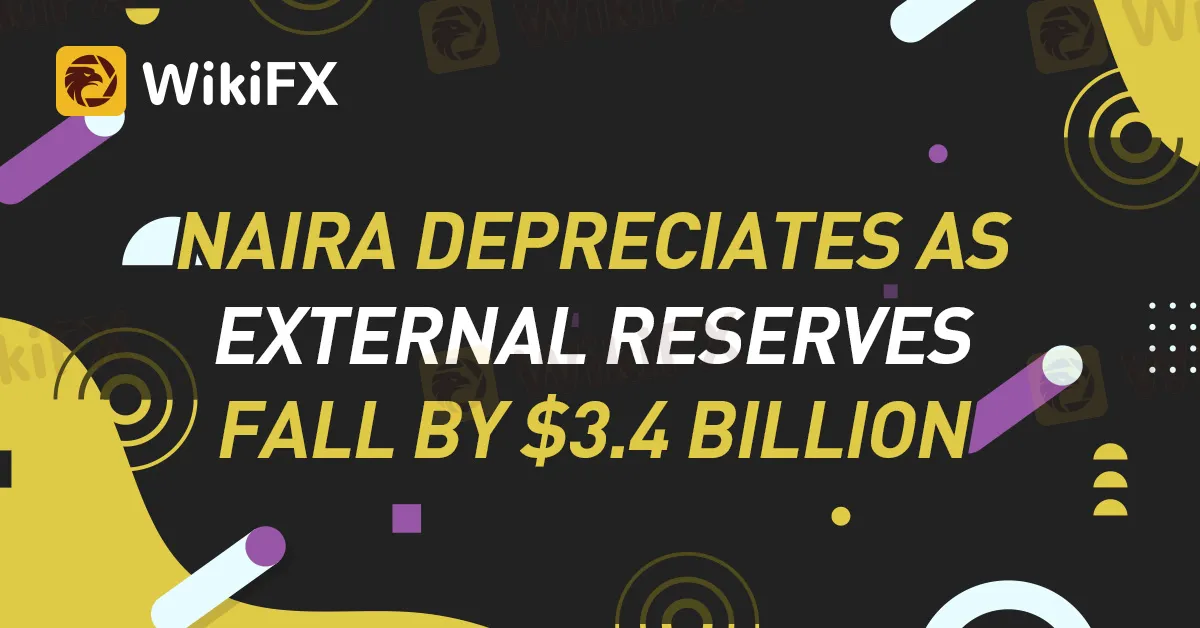简体中文
繁體中文
English
Pусский
日本語
ภาษาไทย
Tiếng Việt
Bahasa Indonesia
Español
हिन्दी
Filippiiniläinen
Français
Deutsch
Português
Türkçe
한국어
العربية
NAIRA DEPRECIATES AS EXTERNAL RESERVES FALL BY $3.4 BILLION
Abstract:On Friday, the naira decreased against the dollar on all foreign currency (FX) markets as squeezed external reserves plummeted by $3.42 billion from now until 2022.

On Friday, the naira decreased against the dollar on all foreign currency (FX) markets as squeezed external reserves plummeted by $3.42 billion from now until 2022.
At the Investors and Exporters (I&E) forex window, Nigeria's official foreign exchange market, the dollar was quoted at N461.67 at Friday's close as opposed to N461.50 on Thursday, a 0.04 percent loss for the Naira.
The unofficial market, sometimes known as the black market, saw a 0.27 percent (N2) depreciation of the local currency on Friday, falling to N742 per dollar from N740 on Thursday.
Data from the Central Bank of Nigeria (CBN) showed that Nigeria's external reserves, which provide the CBN with the means to defend the Naira, decreased by 8.44 percent annually to 37.08 billion as of December 30, 2022 from the $40.50 billion reported at the start of 2022.
In a recent research, analysts at FBNQuest stated that until 2022, the trend in gross official reserves was decreasing.
The key source of FX accretion to the official reserves, foreign exchange input from crude oil sales, was basically nonexistent last year, according to the report.
The official foreign exchange receipt from crude oil sales into Nigeria's official reserves has continuously decreased from over US$3.0 billion monthly in 2014 to an absolute zero dollars, according to Godwin Emefiele, governor of the Central Bank, who made this statement in November 2022.
He stated that there was a severe squeeze on the Nigerian foreign exchange market, which was putting pressure on reserves and suppressing the value of the naira.
On the basis of the balance of payments for the 12 months ending in June 2022, total reserves at the end of December 2022 were sufficient to support imports of goods for 8.4 months and 6.4 months, respectively.
The analysts noted that in order to get a “more true picture,” the gross reserve figure (and the import cover) needed to be adjusted for the backlog of delayed external payments.
The CBN was managed to keep the naira relatively constant on the official market despite the pressure from demand, the article claims. The main method used to do this was FX supply rationing.
Despite the US Federal Reserve's hefty interest rate increases last year, the naira only lost around 9 percent of its value against the US dollar. According to the research, this is in contrast to how most other currencies have performed globally.
According to the data, the Egyptian Pound lost value relative to the US dollar by 36% last year. The Ghanaian Cedi fell even further, by more than 60%.
The analysts predicted that the currency will undergo a significant adjustment this year as a result of the downward pressure on the external reserves.
By the end of 2023, according to FBNQuest, the gross official reserve balance will be roughly USD36 billion. The minor drop from levels at the end of 2022 is primarily attributable to the oil production's gradual improvement as a result of an increase by the security agencies. The proposal by the Federal Government (FG) to end fuel subsidies by June 2023 will also receive approval, according to the article.

Disclaimer:
The views in this article only represent the author's personal views, and do not constitute investment advice on this platform. This platform does not guarantee the accuracy, completeness and timeliness of the information in the article, and will not be liable for any loss caused by the use of or reliance on the information in the article.
Read more

Webull Launches SMSF Investment Platform with Zero Fees
Webull introduces commission-free SMSF trading, offering over 3,500 US and Australian ETFs, with no brokerage fees and enhanced portfolio tools.

How Will the Market React at a Crucial Turning Point?
Safe-haven assets like gold and U.S. Treasuries are surging, while equities face mounting pressure. As this pivotal moment approaches, how will the market react?

Gold Prices Climb Again – Have Investors Seized the Opportunity?
Gold prices have hit record highs for three consecutive days, with a remarkable 19% gain in the first quarter, marking the strongest quarterly performance since 1986. As market risk aversion rises, demand for gold has surged significantly.

The Ultimate Guide to Automated Forex Trading in 2025
Modern markets are revolutionized by automated trading systems, which now execute 70-85% of all transactions. These advanced automated trading software solutions, commonly called trading robots or Expert Advisors (EAs), leverage algorithmic precision for automatic trading across forex, stocks, and commodities 24/7. By removing emotional interference and executing trades in microseconds, auto forex trading platforms create fair opportunities for all market participants. For those new to automated trading for beginners, these systems provide disciplined, backtested strategies while significantly reducing manual effort.
WikiFX Broker
Latest News
Exposing the Top 5 Scam Brokers of March 2025: A Closer Look by WikiFX
Gold Prices Climb Again – Have Investors Seized the Opportunity?
Webull Launches SMSF Investment Platform with Zero Fees
Australian Regulator Warns of Money Laundering and Fraud Risks in Crypto ATMs
FCA Warns Against 10 Unlicensed or Clone Firms
CySEC Warns Against 14 Unlicensed Investment Websites
Top Currency Pairs to Watch for Profit This Week - March 31, 2025
Will natural disasters have an impact on the forex market?
Philippines Deports 29 Indonesians Linked to Online Scam Syndicate in Manila
AI-Powered Strategies to Improve Profits in Forex Trading
Currency Calculator







